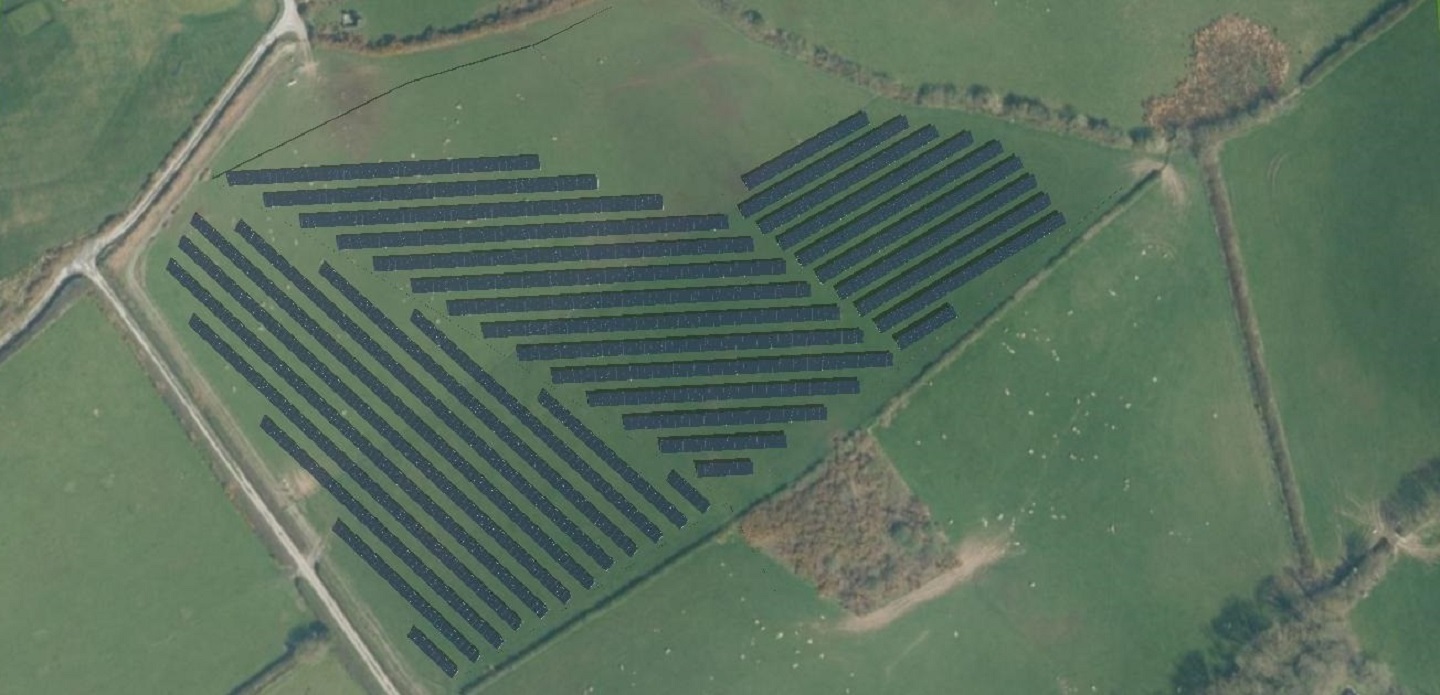Construction gets underway on green energy project

An image of how the new Aberystwyth University solar array will look once it has been completed.
29 March 2022
Work has begun on the installation of a new solar array that will generate green electricity for Aberystwyth University.
The £2.9m investment will provide up to 25 per cent of the annual electricity needs of the Penglais Campus and reduce the University’s carbon emissions by just over 500 tonnes annually, and up to 12,000 tonnes over its anticipated 25-year working life.
Covering an area of 3.8 hectares of University-owned land on Fferm Penglais, the new array will feature more than 4500 individual solar panels and is scheduled to be fully operational by the end of July 2022.
The electricity generated is expected to reduce annual energy-related emissions by 8 per cent across the University’s entire energy portfolio (gas and electricity) and contribute to fulfilling the University’s objective of a zero-carbon estate by 2030/31.
At a time of rising energy costs, the project is expected to deliver financial savings of over £325,000 per annum and over £13m over the lifetime of the project.
Professor Neil Glasser, Pro Vice-Chancellor, Aberystwyth University, said: “We are delighted to be getting construction work underway on this exciting new project which reflects the University’s commitment to reducing our dependence on fossil fuels and cutting our greenhouse emissions.
“Our ambition is for the University’s estate to become carbon neutral by 2030/1. This solar development is an important step towards realising this aim, however, there is much that remains to be done as we tackle some of the underlying challenges society faces and we work to decarbonise our economy for the good of the planet.”
Expected to be carbon neutral within the first few years of its working life, construction on the site will also include work to encourage greater biodiversity in surrounding hedgerows. Once fully operational, sheep will continue to graze the pasture around the panels.
Brian Drysdale, Development Manager, Welsh Government Energy Service, said: “The Welsh Government Energy Service was approached back in 2018 to evaluate Aberystwyth University’s renewables potential. We helped identify an appropriate site by carrying out initial feasibility modelling, and we provided advice on the development of a business case to secure the investment needed. This is another great example of the Welsh higher education sector leading the way towards net-zero and we are excited to see this project coming to life.”
Hayley Bristow, Programme Coordinator, Salix Finance Ltd, which provides funding for public sector energy efficiency initiatives, said: “Salix are proud to be supporting Aberystwyth University in delivering this phase of their Re: Fit Scheme, with £2.6m of funding from the Wales Funding Programme, in partnership with the Welsh Government. The Solar PV Array project will play an important role in the work to decarbonise the public sector in Wales, with more than 500 tonnes of carbon estimated to be saved each year.”
Scott Lutton, Operation Director, North & Scotland, Vital Energi, said: “Aberystwyth University has made some strong progress in meeting its carbon reduction targets and this solar array is another significant investment which shows how committed it is to achieving net-zero. Whilst the primary driver for this project has been carbon reduction, renewable electricity has the additional benefit that it will insulate the University from the rising price of energy.”
Over the past 10 years, Aberystwyth University has reduced its CO2 emissions by over 40 per cent and in 2019 declared a climate emergency.
The University has recently completed a £3m energy performance contract as part of the Welsh Government backed RE: FIT programme which is designed to make buildings more energy efficient.
The Welsh Government Energy Service has supported the University, providing a range of technical and commercial support, to help identify, develop and deliver suitable projects such as the solar project at Fferm Penglais.
The University is also a member of a consortium of UK universities to strike a £50m landmark green energy deal, the first time public energy users have collaborated on a deal of this kind to buy clean electricity.



